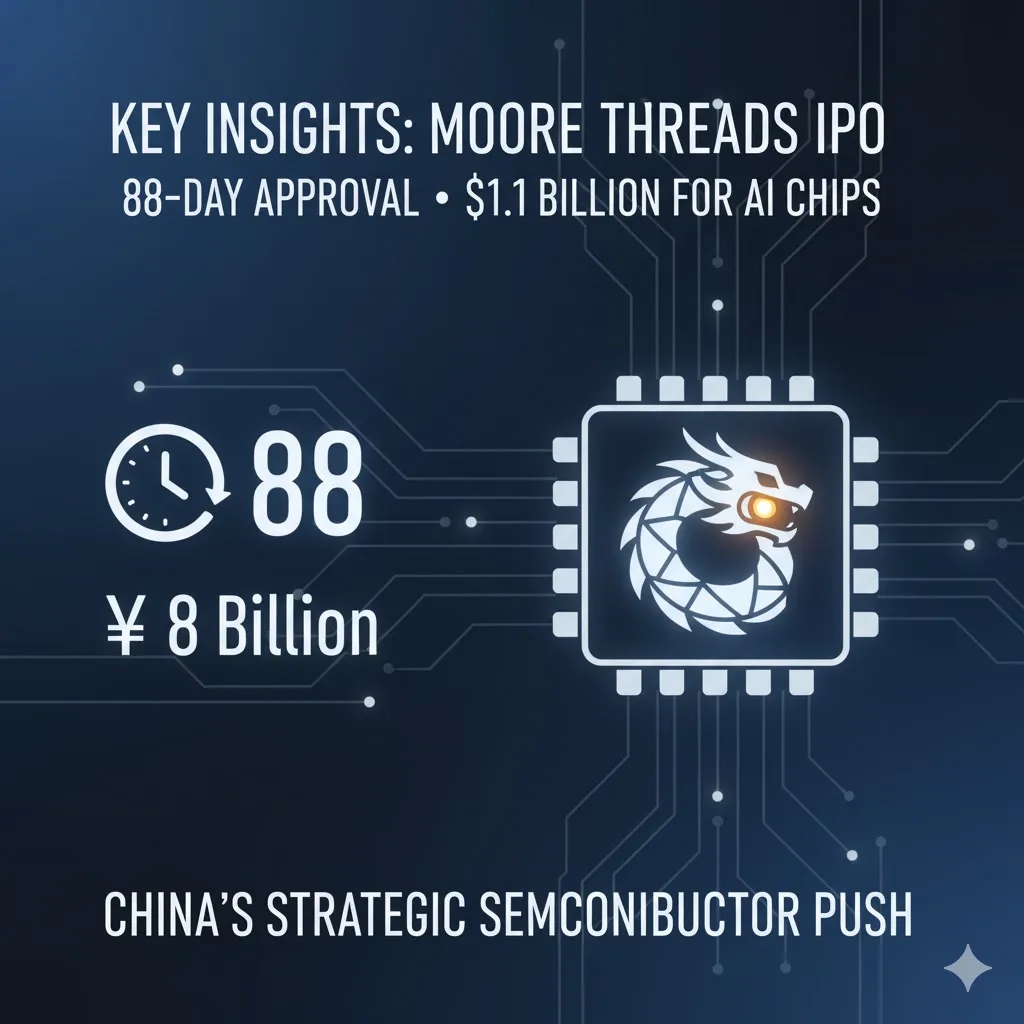Key Insights
- Moore Threads secured IPO approval on Shanghai’s STAR Market in just 88 days, making it one of the fastest approvals in the exchange’s history
- The Beijing-based GPU startup plans to raise 8 billion yuan ($1.1 billion) to accelerate AI chip development and large-scale commercialization
- Founded by former Nvidia executive James Zhang Jianzhong, the company represents China’s strategic push for semiconductor self-sufficiency amid U.S. restrictions
China’s domestic GPU industry reached a pivotal milestone as Moore Threads Technology Co. Ltd. received approval from the Shanghai Stock Exchange for an initial public offering on September 26, 2025. The approval marks a significant acceleration in China’s efforts to develop indigenous semiconductor capabilities, particularly in artificial intelligence and graphics processing technologies that have become critical to national tech priorities.
The Shanghai Stock Exchange’s listing committee cleared the IPO just 88 days after receiving Moore Threads’ application on June 30, 2025, representing one of the fastest approval processes for the Nasdaq-style STAR Market. This expedited timeline reflects the Chinese government’s strategic emphasis on cultivating domestic alternatives to foreign semiconductor technology, especially as U.S. export restrictions continue to limit access to advanced chips.
Strategic Fundraising for GPU Commercialization
Moore Threads aims to raise 8 billion yuan (approximately $1.1 billion) through its IPO, positioning it as the largest fundraising effort under review on the STAR Market this year. According to analysts at Beijing-based think tank Kefangde, the company’s rapid IPO process reflects that the domestic GPU industry is entering a critical commercialization period.
The proceeds will be allocated primarily to fund the development of next-generation AI and graphics chips, as well as to strengthen working capital and support large-scale production capabilities. This capital injection is expected to significantly accelerate the commercial deployment of Moore Threads’ GPU products across Chinese markets, particularly as demand for domestic alternatives to Nvidia chips intensifies.
From Nvidia Leadership to Chinese GPU Pioneer
The company’s founder and CEO, James Zhang Jianzhong, brings substantial industry credentials to Moore Threads. Zhang spent 14 years at Nvidia, ultimately serving as global vice president and general manager of Nvidia’s Greater China operations before departing in 2020 to establish Moore Threads. During his tenure at Nvidia, Zhang successfully increased Nvidia’s market share in China from less than 50% in 2008 to over 80% by 2020, demonstrating his deep understanding of both GPU technology and the Chinese market landscape.
Founded in October 2020, Moore Threads focuses on the design and development of full-function GPU chips capable of supporting both graphics rendering and AI computing workloads. This dual-capability positioning addresses two of the fastest-growing segments in the semiconductor industry, making Moore Threads one of the few domestic Chinese companies with comprehensive GPU expertise.
Financial Performance and Growth Trajectory
Moore Threads has demonstrated substantial revenue growth despite operating in a challenging competitive environment. The company’s revenue expanded from 45.8 million yuan in 2022 to 432 million yuan in 2024, according to the company’s IPO prospectus. However, this growth has come at significant cost, with net losses totaling 4.61 billion yuan over the same period after deducting nonrecurring items.
The company’s research and development investments reflect its commitment to technological advancement, with R&D spending reaching 3.8 billion yuan from 2022 to 2024—more than six times its cumulative revenue during that period. Despite these substantial losses, Moore Threads has shown improvement in operational efficiency. The company’s consolidated gross margin jumped dramatically from -70.08% in 2022 to 25.87% in 2023, reaching 70.71% in 2024, indicating successful product iterations and improving market acceptance.
Geopolitical Context and U.S. Sanctions
Moore Threads’ rapid IPO approval occurs against the backdrop of escalating U.S.-China technology competition. The company was blacklisted by the United States in 2023, joining a growing list of Chinese semiconductor firms subject to export restrictions designed to limit China’s access to advanced chip technologies. These sanctions have created both challenges and opportunities for domestic GPU manufacturers like Moore Threads.
The U.S. restrictions on Nvidia products in China have created significant market opportunities for indigenous alternatives. Moore Threads represents a broader strategy among sanctioned Chinese chipmakers: leveraging large-scale computing clusters to compensate for weaker single-chip performance compared to cutting-edge Nvidia offerings, while investing heavily in R&D to close the technology gap over time.
National Strategic Importance
Moore Threads has been designated as a national “Specialized, Sophisticated, Distinctive, and Innovative” little giant enterprise and recognized as an industry unicorn by Chinese authorities. This classification reflects the company’s strategic importance to China’s semiconductor self-sufficiency goals and its potential to reduce dependence on foreign GPU technology in critical applications ranging from artificial intelligence to gaming and professional graphics.
The company’s approval under the “1+6” reform policies for the STAR Market demonstrates the exchange’s commitment to accelerating listings for technology innovation enterprises aligned with national priorities. Market observers noted that September 26, 2025, marked exactly 100 days since the release of these reform policies, highlighting the improved efficiency and quality of the STAR Market’s review process for strategic technology companies.
Competitive Landscape in China’s GPU Sector
Moore Threads is part of an emerging cohort of Chinese GPU manufacturers working to establish domestic alternatives to Nvidia’s dominance. The company competes alongside other domestic players such as MetaX and Cambricon, each bringing different technical approaches and market strategies to the challenge of building competitive GPU products.
While Moore Threads leverages talent and expertise from Nvidia through its founder’s background, competitors like MetaX trace their technical lineage to AMD, with founder Chen Weiliang having served as a senior director at AMD Shanghai before launching his company in 2020. This diversity of technical approaches and leadership backgrounds enriches China’s domestic GPU ecosystem and increases the probability of breakthrough innovations.
Implications for China’s Semiconductor Strategy
The successful IPO approval for Moore Threads carries significant implications beyond a single company’s financing needs. It signals China’s determination to cultivate a complete semiconductor value chain, from design and manufacturing to commercialization and market deployment. GPUs represent a particularly critical technology node, given their centrality to artificial intelligence development, data center operations, autonomous vehicles, and numerous other strategic technology domains.
The substantial capital that Moore Threads plans to raise—equivalent to over $1 billion—will enable accelerated R&D cycles, enhanced manufacturing partnerships, and expanded market penetration. This financial firepower, combined with supportive government policies and growing domestic demand driven by U.S. export restrictions, creates favorable conditions for the company’s growth trajectory despite its current unprofitability.
As Moore Threads prepares for its public debut on the STAR Market, the company represents both the promise and challenges of China’s semiconductor ambitions: significant technical progress and market growth, but achieved through massive capital investment and operating losses that reflect the difficulty of competing against established global leaders in advanced chip technologies.
Sources
- IndexBox – Moore Threads Approved for IPO on Shanghai Star Market
- 36Kr – Moore Threads Passes Review Successfully
- Shanghai Stock Exchange – Moore Threads IPO Approved by Listing Review Committee
- Global Neighbours – Chinese Chipmaker Moore Threads Gets Fast Track Approval
- KrASIA – Moore Threads Cleared for Shanghai Listing
- Heartspace – Bloomberg: Moore Threads Greenlit for Shanghai IPO
- TrendForce – China’s GPU Trio Rise as NVIDIA Retreats
Discover more from WireUnwired Research
Subscribe to get the latest posts sent to your email.




